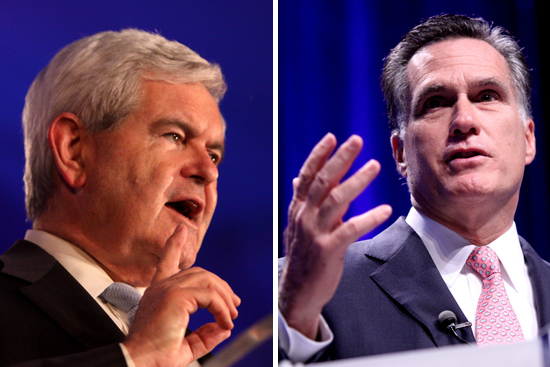BU’s Road to Washington
First in 2012 election series tomorrow

The GOP race between Newt Gingrich (left) and Mitt Romney is heating up. Photos by Gage Skidmore
Newt Gingrich’s stunning come-from-behind victory in Saturday’s South Carolina Republican presidential primary has thrown a turbulent primary season into further chaos, with no clear GOP front-runner yet emerging just a week before the next big contest, in Florida on January 31. Gingrich captured 40.4 percent of the vote January 21 to Romney’s 27.8 percent, handing the man who had been presumed to be the front-runner a double-digit defeat.
In a volatile race that has seen Rick Santorum capture the Iowa primary, Romney the New Hampshire primary, and Gingrich South Carolina, one fact is clear: the GOP is having a hard time settling on a nominee, setting up the possibility for a long-drawn-out fight. Already, Gingrich and Romney are increasing their jabs at each other. If last night’s GOP debate is any indication, the Florida contest, with Ron Paul still in contention, promises to be a bruising battle.
Political junkies will be able to discuss these and other developments in the 2012 presidential election at an event tomorrow titled BU’s Road to Washington: An Election Year Series, at the George Sherman Union Conference Auditorium. Presented by the Boston University Alumni Association, the College of Communication, and the College of Arts & Sciences, the discussion brings together political experts Thomas Fiedler (COM’71), dean of COM, Tobe Berkovitz, a COM associate professor of communication, Dino Christenson, a CAS assistant professor of political science, and Graham Wilson, a CAS professor and chair of political science. The series is the brainchild of Virginia Sapiro, dean of Arts & Sciences, Berkovitz, and Fiedler, who held similar popular discussions during the 2008 presidential election.
This is the high point of the Republican race, says Fiedler, a former executive editor of the Miami Herald and a Pulitzer prize winner, noting that the next few primaries are likely to determine the party’s nominee. The Florida primary will be followed by contests in Maine, Nevada, Colorado, and Minnesota. “Things right now are at a boil, so the timing of the discussion is fortunate, because interest in the Republicans is at its peak,” Fiedler notes. “We’ll have to watch some of the other trends that may come into play and how those will affect President Obama’s ability to win reelection. We thought there might be some interest by alumni, students, and the BU community in being part of the discussion, and in the opportunity to offer their thoughts.”
This year’s Republican primary season has been exciting and different from ones in the past, says Christenson, partly because of the personalities involved. “We’ve had Michele Bachmann’s rise to fame, flirtations with Donald Trump, Newt Gingrich totally fail and then have to reorganize his campaign before his recent rise,” he says. “We have Ron Paul, who did really well in Iowa, but was ignored by the media, Rick Perry, whose speaking style reminds a lot of people of Bush. In terms of the characters, it’s quite fascinating.” But tomorrow’s event will explore the campaign on a deeper level, he says. “After all, what these candidates are saying on the campaign trail will have a strong correlation with what they would do if there were elected into office. Thus beyond the ephemeral interest in the horse race aspect of the campaign is this underlying feature of the campaign, which is what policy positions these candidates are taking, and what the policies of the future may be.”
Obama has managed to lay low during all of the debates and the news coverage, benefiting from a “free ride” lately from the press and the public, says Berkovitz, “as the focus has been on the Republican candidates. If and when they start to take a harder look at Obama, looking at what he has done and how he has disappointed, then it will become a two-person battle.”
And tomorrow’s event will consider broader questions as well, such as whether voter turnout will be as high as it was in the last presidential election. About 131 million people voted in the 2008 election, up from 126 million in 2004, according to the U.S. Census Bureau, which also found that voters 18 to 24 were the only age group showing a significant increase in turnout: 49 percent in 2008, an increase from 47 percent in 2004.
“I think in many ways the turnout of young people in 2008 was driven by their desire and excitement to be part of an historic election—the Democratic primary campaign was going to be historic because either the first African American would get the nomination or the first woman would get the nomination,” Fiedler says. “For those young people, who in many ways idealized Obama, the collision between hope and reality has been a harsh one. The high energy and expectations that people had for Obama in 2008 are unlikely to be repeated in 2012, because reality has intervened over the hopes that people had.”
BU’s Road to Washington will be broadcast live on the BU Alumni Association’s UStream channel. Participate in the conversation on Twitter at @bualumni, using the hashtag #BUr2w.
The first installment in the series BU’s Road to Washington will be held Wednesday, January 25, at 12:30 p.m. in the George Sherman Union Conference Auditorium, 775 Commonwealth Ave. The event is free and open to the public. Attendees are invited to bring lunch and eat as the event takes place. The next installment in this speaker series is March 7, 2012.

Comments & Discussion
Boston University moderates comments to facilitate an informed, substantive, civil conversation. Abusive, profane, self-promotional, misleading, incoherent or off-topic comments will be rejected. Moderators are staffed during regular business hours (EST) and can only accept comments written in English. Statistics or facts must include a citation or a link to the citation.